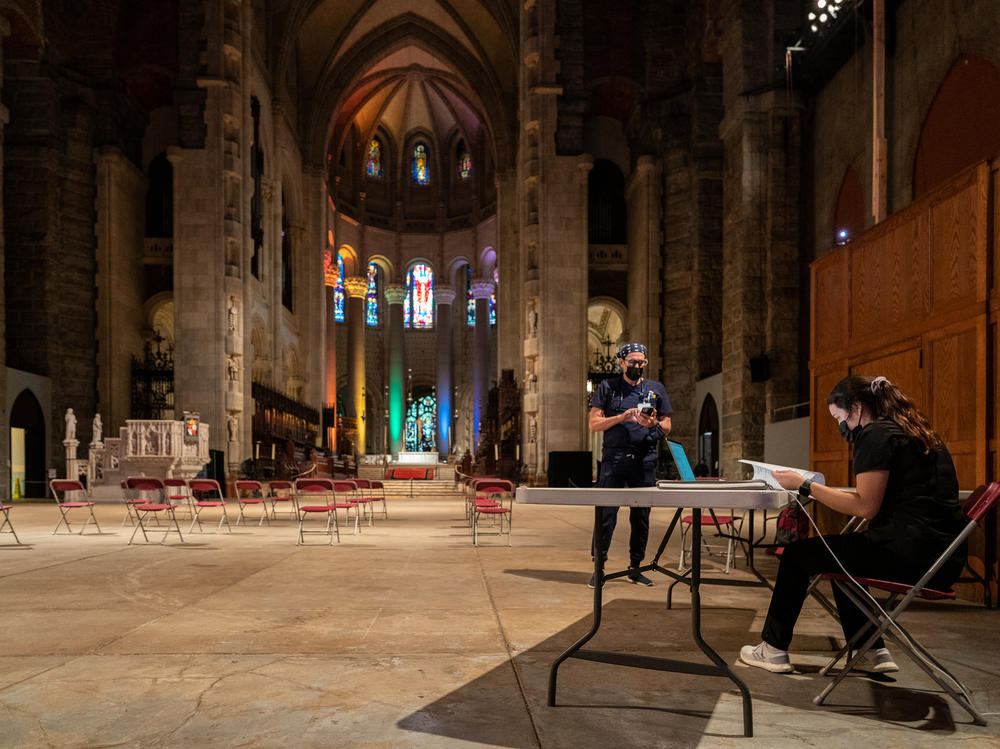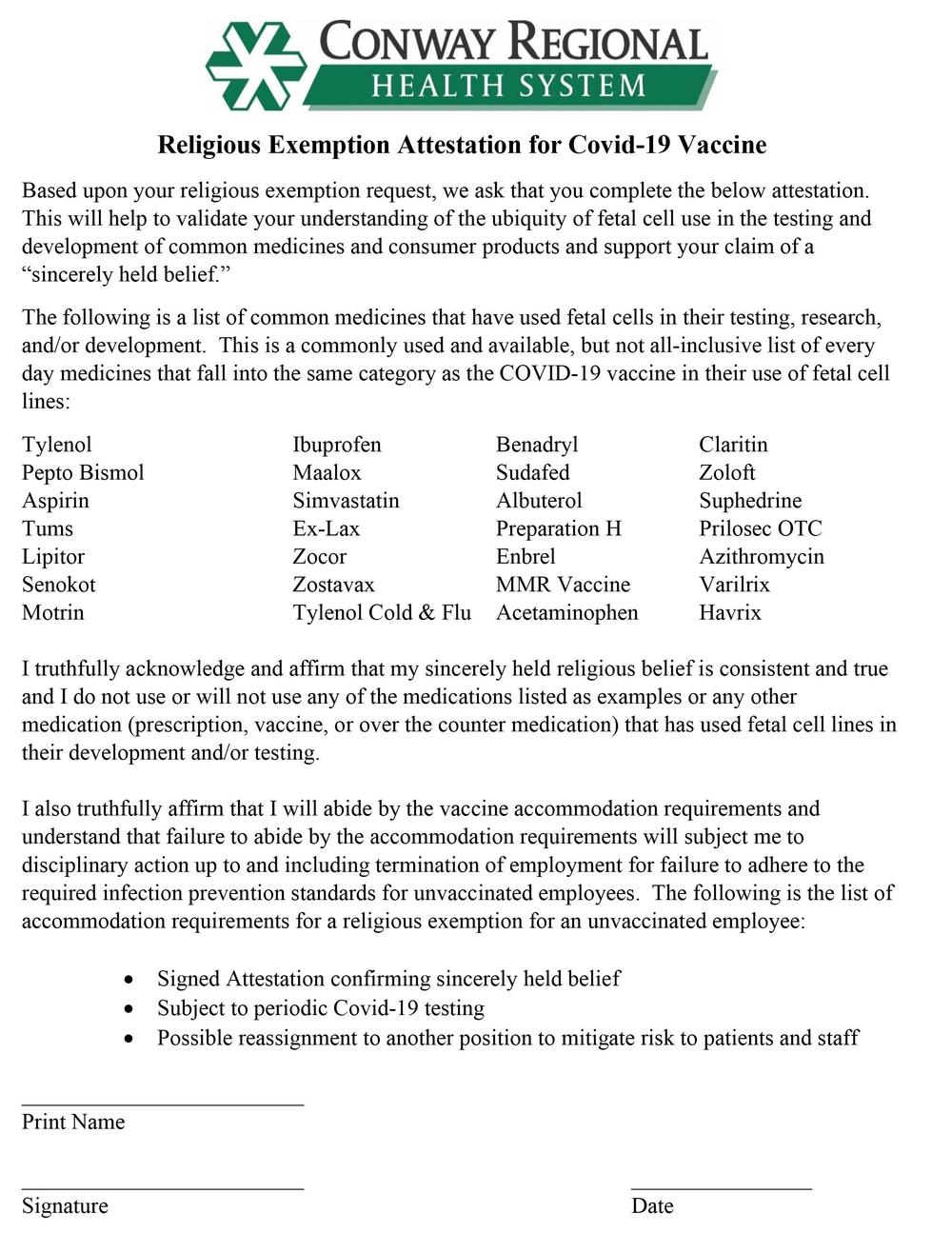Section Branding
Header Content
Getting A Religious Exemption To A Vaccine Mandate May Not Be Easy. Here's Why
Primary Content
More and more employers are ordering workers to get vaccinated against COVID-19 without the option of getting tested instead. Now workers are pushing back.
In Washington, D.C., more than 400 fire and emergency medical workers applied for religious exemptions to the city's vaccine mandate. In Los Angeles, roughly a quarter of the police department is expected to seek religious exemptions.
How many of those requests will ultimately be approved is unknown. Already, some employers are taking a harder line than others. Under the law, employers have a lot of discretion when granting religious exemptions.
What are employer obligations to workers when it comes to religious exemptions?
The right to request a religious exemption stems from Title VII of the Civil Rights Act of 1964, which protects workers from discrimination on the basis of religion, among other things. The Equal Employment Opportunity Commission says employers must provide reasonable accommodations for workers who have sincerely held religious beliefs — unless doing so poses an undue hardship.
There's a lot to unpack there.
First, employers may probe whether an employee's religious belief is in fact sincere. They may ask questions about that employee's vaccination history or church attendance. If the employer determines the belief is not sincere, it may deny the exemption request.
But even if an employee's religious belief is determined to be sincere, it's the employer who decides what the reasonable accommodation will be. It does not have to be the accommodation requested by the employee.
What's reasonable when it comes to a reasonable accommodation?
What one employer deems to be reasonable, another may not.
In Conway, Ark., Matt Troup, CEO of Conway Regional Health System, has granted 45 religious exemptions to employees who refused to get a COVID-19 vaccine. Their objections were largely based on the employees' beliefs that vaccines that used fetal cells in research, testing or production should not be put in their bodies.
(Public health officials say fetal cell lines developed decades ago in the laboratory were used to develop and test the Pfizer and Moderna vaccines — a common practice in pharmaceutical research. Other fetal cell lines are being used in the production of the Johnson & Johnson vaccine. But the vaccines themselves do not contain any fetal cells.)
Before granting the religious exemptions, Troup sent the employees a list of 28 commonly used medicines that also used fetal cells in their research, testing or development — a list that includes Tylenol, Motrin, Tums, Ex-Lax and other medicine cabinet staples. He asked employees to attest to not be using any of those medicines.
"They need to know that if they're going to be consistent in their beliefs, that applies to a lot of different things other than the COVID vaccine," Troup says.
Presented with the list, the employees who had requested religious exemptions still declined the vaccines. So Troup informed them they'd have to undergo regular COVID-19 testing. With 95% of his workforce vaccinated, he felt it was a reasonable accommodation.
"I feel like we've accomplished our goal to protect our staff, our patients and our community," he says. "We want to respect people's religious freedoms and their ability to make these decisions to the point that we can."
But already, there are employers who have been less accommodating.
The NBA recently denied a religious exemption request from Golden State Warriors forward Andrew Wiggins, announcing that the athlete will not be able to play at any home games in San Francisco, which has a vaccine mandate for large indoor events, until he fulfills the city's vaccination requirements.
United Airlines has granted religious exemptions to a small number of employees, but the reasonable accommodation the airline has provided is to put the employees on indefinite unpaid leave without regular benefits. A handful of United employees have sued, saying unpaid leave is not a reasonable accommodation but rather an adverse employment action.
Román Hernández, a labor and employment attorney with Troutman Pepper in Portland, Ore., says historically, courts have upheld unpaid leave as a reasonable accommodation in religious exemption cases.
"It's probably not the accommodation that those workers wanted, but that is something that the employer is providing," Hernández says.
What's considered an undue hardship when it comes to religious exemptions?
Remember that under the law, employers must provide reasonable accommodations to workers seeking religious exemptions — unless doing so poses an undue hardship.
It's important to look at how the EEOC defines undue hardship.
In religious exemption cases, undue hardship is defined as "more than a de minimis," or minimal, cost or burden on the operation of the employer's business. Hernández points out that an accommodation that involves shift changes could constitute more than a minimal burden to an employer, allowing the employer to deny such an accommodation.
In its defense, United has argued that allowing unvaccinated employees to continue working in customer-facing roles on-site "would impose extraordinary — not just de minimis — costs on United and the public." The airline says it would have to implement a coronavirus testing program at more than 100 domestic airports and offices. Running such a program would cause a heavier workload for vaccinated co-workers — and United notes that 97% of its employees are now vaccinated.
Does it matter what the head of my religion says about the COVID-19 vaccines?
Probably not, because religious exemptions ultimately come down to an employee's personal belief and whether an employer can find a reasonable accommodation.
So far, no major religion has come out in opposition to the COVID-19 vaccines. In fact, prominent religious leaders are endorsing them. Pope Francis has told Catholics that getting vaccinated is "an act of love," for example.
Even the Christian Science Church, which counsels prayer rather than medical care, says it doesn't have an official policy on vaccinations. It leaves it up to individuals to make that decision.
What about all the tips being shared online for getting a religious exemption?
Mentions of religious mandates on social media and traditional media outlets have jumped ninefold since June, with most of that spike coming after the White House announced vaccine mandates for federal employees in early September, according to an analysis by media tracking firm Zignal Labs.
In Facebook groups opposed to vaccine mandates, members frequently ask about how to obtain a religious exemption and what to say when petitioning their employers.
In these groups, members regularly cite misleading claims that vaccines contain fetal cells. Others share links to online churches and self-described "consultants" offering signed exemption letters. One company offering these services charges $175 for phone consultations, research, sample forms and a signed letter from a pastor.
But keep in mind, the employer really has a lot of discretion in granting these exemptions whether or not you have one of these signed letters. So people should probably think twice about paying for these services.
Copyright 2021 NPR. To see more, visit https://www.npr.org.


